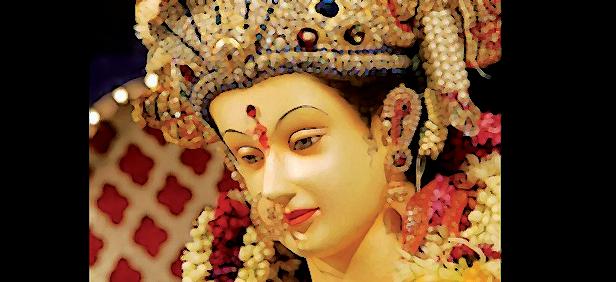
3 minute read
A reflection on Navarātri
from 2012-11 Sydney (1)
by Indian Link
Goddess, divine energy and womanhood epitomise the festival of Navarātri, going deeper than its entertaining exterior
By MAHeSH RADHAKRISHNAN
This year, we were not able to make it back to Sydney to spend Navarātri with my parents. But the festival, as always, is a good opportunity to reflect on the concept of Shakti or the Goddess that is manifest as nature, the flow of energy in the cosmos, and womanhood.
The philosophical elements of Shakti are relevant and transcend the confines of religion and doctrine, so I invite readerswhatever your faiths and gender - to journey with me on this reflection on a Hindu tradition.
Navarātri, the nine nights of the Goddess, celebrates the various aspects of Shakti, including the forms of Lakshmi - abundance; Durga - destruction (which always entails regeneration), and Saraswati - creativity and knowledge. The idea is that these concepts of flowing abundance, flowing destruction, and flowing creativity are female forms of divinity. Through worship we express our gratitude to them, and recognise that their embodiment on earth is in womanhood.
While some Hindus may wax lyrical about the place of women in philosophy and ancient practice, current conservative Hinduism still largely maintains women to have secondary status. I cannot say how long it has been this way, but the fact that continuing practices such as the dowry system, restrictions placed on widows and menstrual ‘impurity’ are entrenched (not to mention the more extreme institution of be an issue grounded in secular life - and I think this is largely a good thing - there are some contributions to be made by the Hindu philosophical tradition and the way people approach it. The abstraction of energy, nature, (positive) destruction, abundance, creativity and knowledge as forms of feminine divinity is one useful aspect.
However, these spiritual ideals can conflict when we come to certain rituals, for example, rituals where women pray for the long lives of their husbands (one of these is called kāradaya nōmbu). It is reprehensible that the onus is on women to pray for the long lives of their husbands. One solution is to abandon such prayers. The other approach is to adapt the tradition as an opportunity for both partners to pray for one another’s long life. We are constantly adapting our traditions to contemporary life and this should not just be limited to practicalities (such as shorter ceremonies due to
J OB t itle: accO untS
B OOKK eeper
Experienced accounts clerk / bookkeeper required to work in friendly office for a concrete contracting company.
Experience with MYOB is essential. Duties include accounts payable, receivables, various project reports and payroll. Must have attention to detail and motivated.
Chipping Norton. Joe 0414 282 066 time constraints or the use of lamps instead of fire), but social progress.
Subramanya Bharati, the great Tamil poet and Indian freedom fighter kept alive the connection between devotion and gender justice through his devotion to the Goddess in Kāli and Shakti, as well as his dedication to the emancipation of women through access to education and social participation beyond the traditional role of motherhood.

In his poem and song Om Shakti Om, which I learnt from my first singing guru Lakshmi Raman, he sings the praise of the Goddess as manifest in all forms of divinity - both male and female. The final verse praises Lakshmi described as ‘Thirumahal’, or ‘the auspicious one’. The Tamil word ‘mahal’ means ‘daughter’. While I have not delved into the origins of the name ‘Thirumahal’ for Lakshmi, there are certainly strong connotations of womanhood. In life.
Bharati’s verse, he suggests that “by meditating on Thirumahal, we will have abundance and our inner light will take flight”. An added layer of interpretation is that by meditating on the auspiciousness of womanhood (and not just dominant ideas of what an ideal woman should be) we make our lives worthwhile.
The spiritual dimensions of Navarātri carry with them a beautiful message. And while many of us may absorb ourselves in the colour of traditional practices such as garba, temple festivities and golu, it’s worth seeing how the philosophy of revering womanhood and femininity can be applied in everyday social life. And though the division of male and female is based on biological reality, there is diversity in the ways that they manifest in people, another layer in the quest for gender justice between and beyond the genders.
POSITION VACANT Smithfield
Ladies required to work in warehouse sorting Second Hand Clothing for Export Company. Full training provided.
Must provide Tax File Number. Casual - Award Wage Monday – Friday 8.30am – 4.00pm
ONLY hard working and reliable people to apply in person Mon - Fri between 9.30am - 3.00pm
Southern Globe Pty Ltd 3 Tait Street Smithfield









